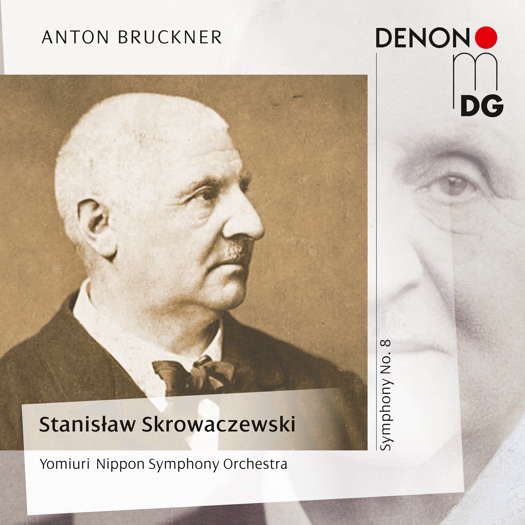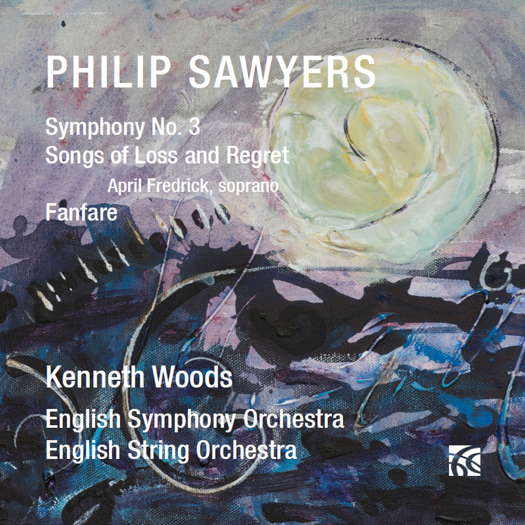ARTICLES BEING VIEWED NOW:
- Régine Crespin
- Hector Berlioz
- Ruth Railton
- Marián Varga
- Profile. A Very Positive Conductor - Paul Bodine talks to Los Angeles Opera's Music Director Designate, Domingo Hindoyan

Feverishly Exciting
GERALD FENECH ardently recommends Skrowaczewski's 2016 recording of Bruckner's Eighth Symphony
'... full of energy and emotional visionary splendour ...'
Anton Bruckner's Eighth Symphony is the last he would complete. He never lived to finish his Ninth, so the Eighth can be regarded as his summation of his symphonic journey. And what a summit the Eighth is!
Bruckner himself said when he finished the work's gigantic finale:
Hallelujah! ... The finale is the most significant movement of my life.
Themes from the work's huge movements sound together at the end of the symphony, a moment that burns with what Robert Simpson describes as a 'blazing calm'. It's the end point of an eighty-minute symphonic journey, and it's one of the most existentially thrilling experiences a symphony has ever created. Bruckner's achievement is to make you feel, when you get there, that the whole experience of the piece is contained and transfigured in this crowning coming-together of symphonic space and time, and that the work's sublime darkness - like the terrifying abysses of dissonance in the first movement, the kind Furtwängler described as the composer's 'battle of demons' - and its equally transcendent light, like the climax of the ethereal Adagio, are simultaneously vindicated and vanquished by the sheer, breathtaking magnificence of this music, the last symphonic coda that Bruckner would ever compose.
Listen — Bruckner: Finale. Feierlich, nicht schnell (Symphony No 8 in C minor)
(650 2307-2 CD2 track 2, 19:55-20:49) ℗ 2024 MDG :
The Eighth occupied Bruckner for three years, whereupon the score was sent to the conductor Hermann Levi, a man Bruckner had thought would be his ultimate champion. Levi was, however, completely bewildered by the work and rejected it on the grounds that it was unplayable. He even suggested that the composer should re-write much of the score, and this resulted in Bruckner having to chop up much of what he had initially written. These were indeed eight tortuous years for Bruckner, but his perseverance at last paid off. The Eighth was premiered in Vienna on 18 December 1892 with Hans Richter conducting, and the performance was acclaimed with frantic applause after each movement and the composer was even presented with three laurel wreaths.
Listen — Bruckner: Allegro moderato (Symphony No 8 in C minor)
(650 2307-2 CD1 track 1, 0:01-0:52) ℗ 2024 MDG :
This is what renowned conductor Yannick Nézet-Séguin has to say on the Eighth:
The architecture is so long and vast, but it's the most well-controlled. It's the most perfect creation, I think, of Bruckner's. Accept that space and time are different, that it is not about the micro event, it is about the grand line. Just breathe in, breathe out, and feel the connection of that music to the harmony of the universe.
And eminent conductor Christian Thielemann adds:
Bruckner's strength lies in his slow development, not in the rapid tempo. It's the same as the infinite horizon you experience at sea where there are very few waves: the power is immense.
Listen — Bruckner: Adagio (Symphony No 8 in C minor)
(650 2307-2 CD2 track 1, 18:27-19:17) ℗ 2024 MDG :
Indeed, this symphony is a mighty fortress and a thrilling ride from darkness into light. Its world is by turns complex, gracious, peaceful and turbulent. Bruckner invites you in, takes you along, and never lets you go.
Listen — Bruckner: Scherzo. Allegro moderato (Symphony No 8 in C minor)
(650 2307-2 CD1 track 2, 15:27-16:24) ℗ 2024 MDG :
Stanisław Skrowaczewski and his Japanese ensemble, the Yomiuri Nippon Symphony Orchestra, deliver a feverishly exciting performance full of energy and emotional visionary splendour that injects the listener with a life-enhancing experience. Not the stuff of legends, but undeniably a version to savour and enjoy, and a most convincing case for those who are still not familiar with this unique masterpiece. Ardently recommended.
Copyright © 14 February 2024
Gerald Fenech,
Gzira, Malta




